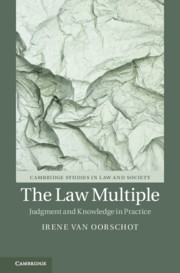Book contents
- The Law Multiple
- Cambridge Studies in Law and Society
- The Law Multiple
- Copyright page
- Dedication
- Contents
- Figures
- Acknowledgments
- Note on the Text
- 1 Troubling Encounters
- 2 Abstractionism, Revisited
- 3 Dealing with Difference
- 4 Situating Remorse
- 5 Visualizing Cases
- 6 Folding Times, Making Truths
- 7 Productive Fictions for the Study of the Law
- Notes
- Works Cited
- Index
- Cambridge Studies in Law and Society
4 - Situating Remorse
Published online by Cambridge University Press: 18 February 2021
- The Law Multiple
- Cambridge Studies in Law and Society
- The Law Multiple
- Copyright page
- Dedication
- Contents
- Figures
- Acknowledgments
- Note on the Text
- 1 Troubling Encounters
- 2 Abstractionism, Revisited
- 3 Dealing with Difference
- 4 Situating Remorse
- 5 Visualizing Cases
- 6 Folding Times, Making Truths
- 7 Productive Fictions for the Study of the Law
- Notes
- Works Cited
- Index
- Cambridge Studies in Law and Society
Summary
In this chapter, I venture into the courtroom. There, I show, accounts are elicited, truth and falsehood are at stake, and the “soul” of the deviant subject becomes a matter of empirical interest: is s/he really sorry? Here, emphasize in particular the local, narrative production of remorse. How, in other words, do defendants manage to “perform remorse” in court? How do judges make sense of defendants’ remorsefulness? How is it weighed and evaluated, and what are its consequences to judicial decision-making? Drawing on informal conversations with judges and in-court observations, this chapter demonstrates the narrative texture of judicial sense-making and decision-making, and the possible tensions that may arise between pursuing self-defense as a defense strategy and appearing sufficiently remorseful. I also show how narratives are subject to practices of typification, distinguishing between three typified whole-case narratives: the typical “angry young man”, the typical drug-addict, and the typical “explosive couple”. These three typified whole-case narratives help judges to make sense of and weigh defendants’ demonstrations of remorse. Here, I also highlight the methodological affordances of observation and informal conversation in shedding light on the narrative texture of legal practices, and contrast this emphasis on narrative with statistical approaches to judicial decision-making.
Keywords
- Type
- Chapter
- Information
- The Law MultipleJudgment and Knowledge in Practice, pp. 85 - 115Publisher: Cambridge University PressPrint publication year: 2021



